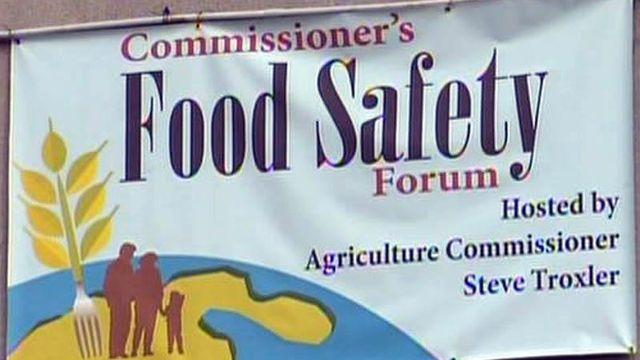Officials urge better protections for food supply
Hundreds of state and federal regulators, educators and lawmakers met Tuesday to discuss ways to protect North Carolina's food supply from contamination.
Posted — UpdatedThe Food Safety Forum, which was hosted by state Agriculture Commissioner Steve Troxler, comes in the wake of recalls in recent years of products containing peanut butter, ground beef and spinach, as well as imported pet food.
A salmonella outbreak associated with peanuts last winter, for example, sickened hundreds of people nationwide and killed nine.
"There was over 2,800 recalls of products associated with that (peanut butter) out of Georgia," said Joe Reardon, director of the state's Food and Drug Protection Division.
The massive recall scared consumers enough that peanut farmers statewide were hurt economically. Troxler said the state is still recovering from the scare.
“You know, it takes months to rebound. The key is public confidence,” he said.
Tainted batches of peanut products traveled all over the country, even hitting a Kellogg’s cracker plant in Cary, which had to be closed for weeks to be cleaned.
Troxler ordered a sweeping round of peanut plant inspections in North Carolina, but he said the best way to keep widespread contamination from happening again is by strengthening the country's food laws.
“We’re not able to identify these problems quickly enough to say quickly that everything is safe now,” Troxler said. "I think we need to be more prepared in being able to keep things from happening, rather than being more reactionary.
"Right now, it's actually a hodgepodge of the way the thing works."
Michael Taylor, a food safety expert and senior adviser at the U.S. Food & Drug Administration, said current laws are decades old and need to be updated to give regulators more tools to address problems.
"We need a law that systematically establishes a duty among the companies to prevent problems and strengthens the FDA's ability to hold companies accountable for prevention," Taylor said. "With very large parts of the food supply coming from overseas, we need to be sure that (foreign) farm producers meet the same preventive standards that are going to be implemented domestically."
The FDA, for example, doesn't have the power to order a recall and has to ask companies to comply voluntarily. The U.S. House passed a bill about two weeks ago to change most of that. Congressmen Bob Etheridge and Brad Miller both voted for it.
Still, Reardon said, most of the responsibility for food safety will come down to state and local inspectors.
"Ninety percent of all the food safety work is done by the state and done by our local (agents). So, really, food safety starts here at the state and local (levels)," he said.
The hope is that better training for growers, manufacturers and inspectors can help prevent illness, he said.
"What we hope consumers will see is more of an emphasis on prevention, eliminating the opportunity for pathogens to be in a product," he said.
Parents like Nellie DeJone said they count on inspectors to keep the food they buy for their families safe.
"I would like to know that my food is coming to me in as natural and as safe a form as possible," DeJone said.
• Credits
Copyright 2024 by Capitol Broadcasting Company. All rights reserved. This material may not be published, broadcast, rewritten or redistributed.






